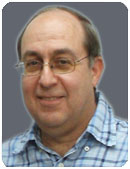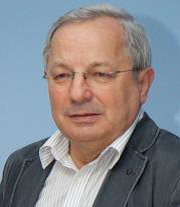
Keynote Speakers
|
|
Mordechai (Moti) Ben-Ari Department of Science Teaching Weizmann Institute of Science Rehovot, Israel |
In Defense of Programming
The activity of programming is often seen to be the epitome of all that is boring in computer science. The response of some educators is to attempt to show that programming is not the only and not even the primary activity of those engaged in CS. There is design, management, interaction with users, and so on. I would like to defend the (perhaps controversial) position that programming is the fundamental activity of CS and therefore shouldn't be swept under the rug. The position is based upon a broad view of what it means to program, so that whatever one's job title, almost everyone is programming, almost all the time. Furthermore, since the program is where "the rubber meets the road" (from a jingle used in ads for the Firestone tire company), any CS activity must be carried out with a primary focus on its contribution to the fitness of the end-product, the program. Finally, to carry out higher-level activities such as marketing and management, one must have extensive programming experience in order to successfully negotiate feasible specifications, deadlines and budgets for software development. The talk will conclude with the curricular consequences that can be drawn from this position.
About the Author
Moti Ben-Ari is a professor in the Department of Science Teaching of the Weizmann Institute of Science, where he heads a group that develops courses in computer science for middle- and high-school students and carries out pedagogical research. He has a PhD degree in mathematics and computer science from Tel Aviv University. Ben-Ari’s research interests include the use of visualization in teaching computer science, tools and techniques for learning concurrent and distributed computation, and teaching computer science to middle-school students, previously with Scratch and now with robotics activities. Ben-Ari is the author of a dozen textbooks on concurrent computation, programming languages, mathematical logic, and the nature of science. In 2004, he received the ACM/SIGCSE Award for Outstanding Contributions to Computer Science Education and in 2009 he was elected as a Distinguished Educator of the ACM.
|
|
Maciej M. Sysło Faculty of Mathematics and Computer Science Nicolaus Copernicus University, University of Wrocław |
From Algorithmic to Computational Thinking: On the Way to Computing for all Students
Computational thinking, as coined by Jeannette Wing, is a fundamental skill for all to be able to live in today’s world, a mode of thought that goes well beyond computing and provides a framework for reasoning about problems and methods of their solution. It has a long tradition as algorithmic thinking which within computer science is a competence to formulate a solution of a problem in the form of an algorithm and then to implement the algorithm as a computer program.
Computational thinking is not an adequate characterization of computer science as claimed by Peter Denning and he is right – it is a collection of key mental tools and practices originated in computing but addressed to all areas far beyond computer science. As an extension of algorithmic thinking, it includes thinking with many levels of abstraction as a problem solving approach inherently connected to computer science and addressed to all students to use computers and computing skills in solving problems in various school subjects coming from various scientific and applied areas. Computational thinking involves concepts, skills and competences that lie at the heart of computing, such as abstraction, decomposition, general-ization, approximation, heuristics, algorithm design, efficiency and complexity issues and therefore it is clear that basic computer science knowledge helps to systematically, correctly, and efficiently process information, perform tasks, and solve problems. Although coming from computer science, computational thinking is not only the study of computer science, though computers play an essential role in the design of problems’ solutions. It is a very important and useful mode of thinking in almost all disciplines and school subjects as an insight into what can and cannot be computed.
In this talk we shall discuss a new computing curriculum addressed to ALL students in K-12 in Poland which motivates them to use computational thinking in solving problems in various school subjects. Moreover its goal is to encourage and prepare students from early school years to consider computing and related fields as disciplines of their future study and professional career. To this end, the curriculum allows teachers and schools to personalize learning and teaching according to students’ interests, abilities, and needs.
The new computing curriculum benefits a lot from our experience in teaching informatics in our schools for almost 30 years – the first curriculum was approved by the ministry of education in 1985, 20 years after the first regular classes on informatics were held in two high schools in Wrocław and in Warsaw. Today, informatics is an obligatory subject in middle school (grades 7-9) and high school (grades 10-12) and it will replace computer lessons (mainly on ICT) in elementary schools (grades 1-6). The new curriculum is also addressed to vocational education.
About the Author
Maciej M. Sysło: mathematician and computer scientist, academic and school teacher, instructor at in-service courses for teachers, organizer of the Bebras Competition, author of informatics and ICT curricula, educational software, school textbooks and guidebooks for teachers, member of several national committees on education, Polish representative to IFIP TC3, recipient of national and international awards and grants: Mombusho (Japan, 1974-1976), Humboldt (Germany, 1982-1984), Steinhaus (Poland, 1986), Car (Poland, 2010), Fulbright (USA, 1996-1997), Best Practices in Education Award (Informatics Europe, 2013), IFIP Outstanding Service Award (2014).


